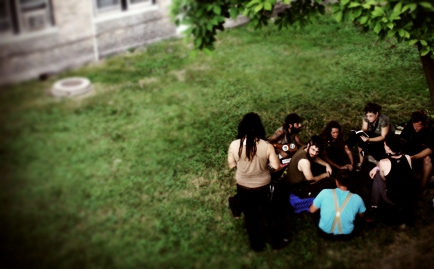She was sitting in my office: crying, confused, not knowing what to say or do or even think. She had just found her son’s prayer journal and the message she read over and over again was that her son wanted to go home. He was in the seventh grade and he wanted his suffering to end. He wanted to die and have God take him away from this place so that he could finally have some peace.
I had been a youth worker for 6 months and I had no words. I clumsily recommended that the child go and seek counseling, but I had nothing to say.
I couldn’t tell her his views on heaven were misguided, that he hadn’t read through the rest of story where heaven and earth become one. I couldn’t tell her that her son was called to love mercy and fight for justice. I couldn’t tell her that when Jesus teaches us to pray, he teaches us to pray for God’s kingdom to come, for God’s will to be done on earth as it is in heaven. I couldn’t tell her her son gets to be a part of this breathtaking journey called the Christian life and I couldn’t ask her why he wouldn’t want to be a part of it. I couldn’t ask her because I didn’t know then what I know now.
It was years later when I was fortunate enough to take seven days and experience Holy Week—the days between Palm Sunday and Easter. Holy Week is one of the those odd traditions that only seem to have a market for really nerdy theology students. For most, Easter means hard-boiled eggs, chocolate rabbits and spending time with family. But for those of us fascinated by this set of odd rituals, there is something significant found in reliving the drama of the days between Jesus’ entrance into Jerusalem and the resurrection celebrated on Easter Vigil.
During one of these nights, I was encouraged to come, sit and find some solitude in the sanctuary. I arrived with a few others at 2 o’clock in the morning and we each found a place to pray and meditate on what we were experiencing. I took the time to reread the end of each gospel, from Judas’ betrayal to the resurrection. And as I sat there, I couldn’t help but think of what it would have been like for Mary Magdalene.
I imagined what was going through her mind as she saw him hanging there. Here was this man, who, in one way or another, she loved.
She was welcomed to sit at his feet. She followed him for years, worked with him and along side him, ministering to those in need. She and the others thought they were doing something of such importance that everything around them was going to change. They thought he was the Messiah, with all the political and theological weight that word has. And now, he was dead.
All the work they had done was in vain.
I could just imagine the haze that came over Mary as she made her way back from the cross through the dirt streets of Jerusalem to a small room where she would have collapsed by one of the other disciples. A kind of numbness would have settled over the room as she shared how everything transpired. I could imagine John interjecting here and there as he wept. I could imagine Martha so broken by Mary’s story that her only response would have been to bring the others some food, urging them to eat.
They all might have stayed together the next day in honoring the Sabbath, but I wonder what Mary was thinking as she made her way with the others the next morning. It was still dark as they traveled back through the streets of Jerusalem towards the garden, where her friend had been laid. There was only one task left, to prepare his body—an act that would have made them unclean, but an act that would express their love through sweat and tears.
Far too often, we look past this part of the story. We get so excited by resurrection and hope that we miss the pain of the disciples. We don’t like dwell in their suffering. We don’t want to experience the death of Jesus. We don’t comprehend that as Jesus descents into hell, God risks everything for us—even God’s very self. We look past this event just as we look past others who are suffering.
We tell them it will be better soon but instead of grieving with them, we move on, burying the hurt and confusion of the moment. We don’t realize that God never wanted us to experience death. We don’t realize that even for God, death is the greatest spiritual misery. We don’t realize that when we hurt, God hurts. And that has to change because the way we think about faith and God are important.
The way we think about death is not just important in the midst of crisis or tragedy. It’s not just important during sunday school or catechism, as awkward youth workers attempt to address the bigger issues.
It’s important in all the small twists and turns that shape us, that force us to decide whether or not we will be faithful in each moment that passes, whether or not we will be humbled when we recognize Jesus in the least of us.
Only then, when we take the full weight of Jesus’ death. can we fully comprehend the fragile moments of tragedy. Because only then can we fully understand the grace Jesus shows us along the way: in a loved one whom bears the same sorrow as we do, in a stranger who offers a moment of warmth or generosity in absolute chaos or absolute loneliness, or in a gardener who showed Mary that everything had in fact changed.





















